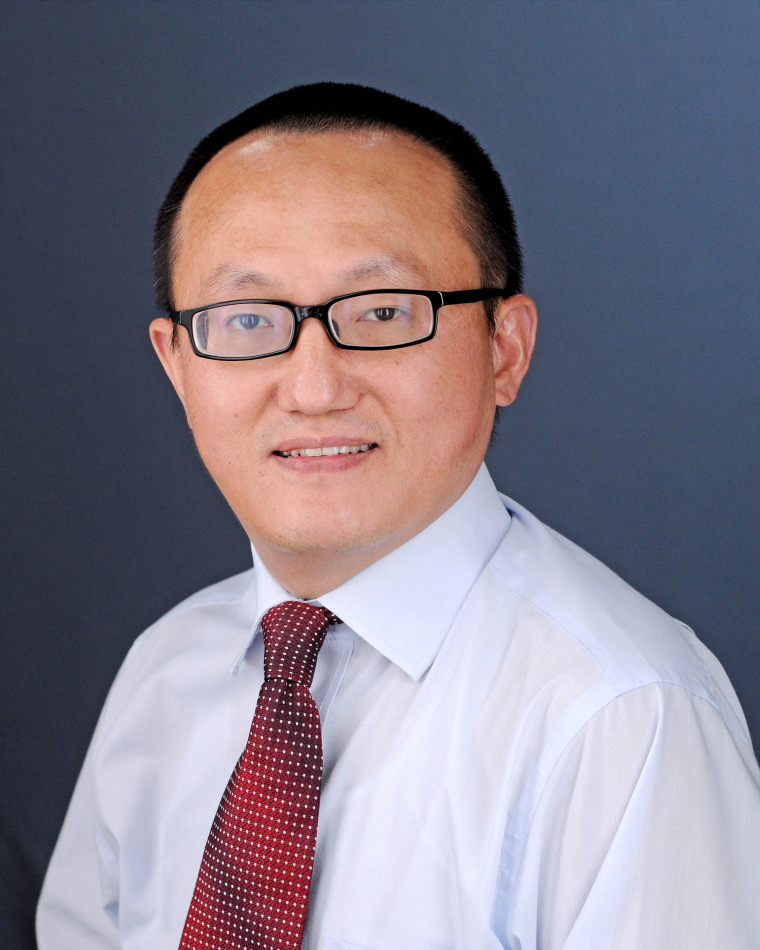Franklin Tao, an Asian American scientist who was wrongfully accused of spying for China, is suing the University of Kansas, his former employer, accusing it of “vicious, unabated discrimination.”
Tao, a chemistry professor, said in a lawsuit filed last week that he was “unfairly and unlawfully” terminated from his tenured position and is seeking to be reinstated.
 Feng "Franklin" Tao, a professor at the University of Kansas, poses in this undated photo.Kelsey Kimberlin / University of Kansas via Reuters
Feng "Franklin" Tao, a professor at the University of Kansas, poses in this undated photo.Kelsey Kimberlin / University of Kansas via ReutersTao was falsely accused in 2019 of economic espionage, making him the first professor arrested and jailed under the contentious Trump-era China Initiative. The since-shuttered national security initiative was widely criticized for racial profiling and targeting Asian American scholars. It was amid his yearslong case that Tao, who was acquitted last year, alleges in the complaint that the school collaborated with the Justice Department to “persecute” him.
“Professor Tao’s life, career, reputation and finances are in shambles as a result of KU’s egregious conduct,” the complaint says. “Rather than embracing academic rigor and enlightened, critical judgment, the university allowed itself to join in fear mongering and racist witch hunting.”
Neither the University of Kansas nor the Department of Justice responded to NBC News’ requests for comment.
In the lawsuit, Tao alleges that a visiting scholar at the university had demanded $300,000 from him in 2019, claiming she had failed to receive proper credit for a paper and threatened to report him to the FBI for economic espionage. After Tao “refused to be extorted,” the scholar falsely and anonymously reported him to the university, saying he was not only involved in spying, but also held another full-time position in China, the complaint said.
The university reported the allegations to the FBI without speaking to Tao or assessing the credibility of the information, the complaint says. The school later “worked closely” with the bureau on its investigation into the professor, the suit says, adding that it engaged in unlawful surveillance of Tao and, in one instance, worked with the agency to arrange a surprise search of his lab and home.
Text messages between the university’s then-deputy general counsel and FBI agents, printed in the complaint, show “improper collaboration” between the two parties, the suit says. In one such text exchange, the deputy general counsel called the agents “my Wonder Twins” and the agents bantered with comments like, “Ok mom.” And after Tao was arrested, the counsel texted the FBI agents, “Job well done, gentlemen. Congrats, and thanks,” the complaint said.
“Rather than protecting its own faculty, KU acted as an arm of the government in prosecuting Professor Tao,” the suit said.
The complaint also says that the university terminated Tao in 2023 before his criminal proceedings had concluded, violating a signed agreement, seen by NBC News, that stipulated it would wait until the end of the proceedings before taking action on his employment status.
Tao was convicted in 2022. However, his lawyer argued that year that the criminal actions against the professor, who immediately moved for acquittal, was not considered final until the judgment of conviction was rendered, appeal exhausted and the time for a petition elapsed or denied.
After he was acquitted of all charges in July, the university continued to refuse to reinstate him, the complaint said.
Tao was found guilty on three counts of wire fraud and one count of making a false statement. But a judge threw out the wire fraud convictions a few months later. It wasn’t until July that the final count was cleared by the 10th U.S. Circuit Court of Appeals in Denver.
The China Initiative, under which Tao was arrested, was suspended by the Biden administration in 2022 after it drew backlash for casting a cloud of suspicion over scholars and scientists in the Asian American community. Last September, however, House lawmakers attempted to revive the measure in a 237-180 vote. Since then, several Asian American and civil rights groups have been railing against the move. The Biden White House has condemned the initiative’s potential revival.
“The bill also could give rise to incorrect and harmful public perceptions that DOJ applies a different standard to investigate and prosecute criminal conduct related to the Chinese people or to American citizens of Chinese descent,” the Biden administration said in a statement.
In addition to reinstatement, Tao is seeking damages for lost wages, reputation injury and emotional distress, as well as an award for attorneys’ fees and other relief.
.png)
 3 hours ago
8
3 hours ago
8


































 Bengali (BD) ·
Bengali (BD) ·  English (US) ·
English (US) ·